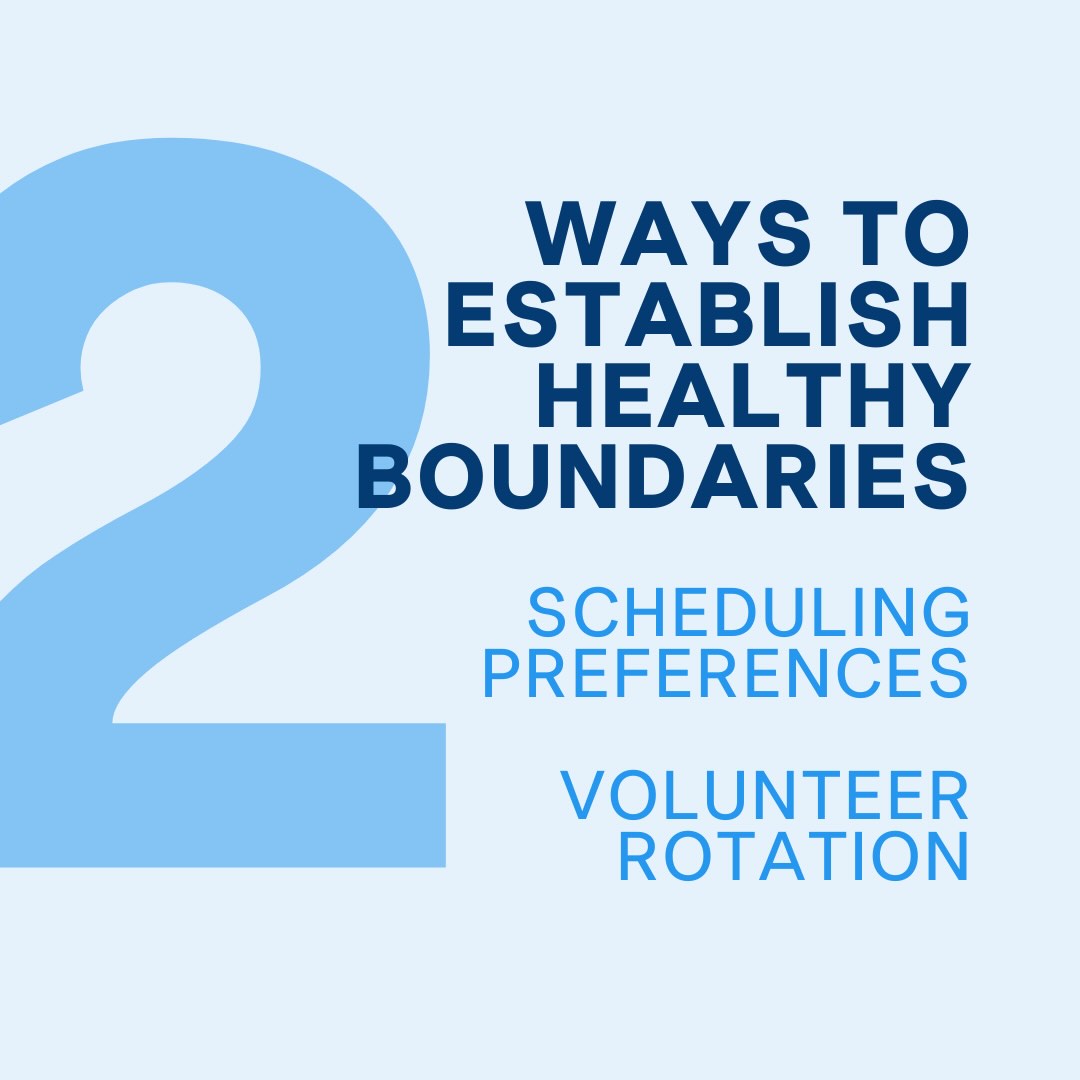Why Church Volunteers Burnout - Scheduling

Dedicated volunteers are the heartbeat of any thriving church. Yet, as any experienced church leader knows, there's a perplexing challenge that frequently emerges - church volunteer burnout.
While there are various reasons why dedicated church volunteers might step back from their roles, one recurring issue stands out: scheduling.
It's a seemingly mundane concern, but it can have profound effects on the morale and commitment of our volunteers. In this blog post, we'll delve into the intricate world of scheduling and explore why it can lead to volunteers walking away from the work they hold dear. Together, we'll uncover practical solutions to help keep the heart of your congregation strong so your church can thrive.
Church Volunteer Burnout
Church burnout is real and more than just fatigue. Everyone gets tired while doing ministry! I know I certainly have been.
Burnout is when a person gets so worn down that they can't keep going without serious emotional, mental, and spiritual consequences.
But burnout doesn't happen overnight. It happens slowly, building up over time. And if we're not careful, it can be our fault.

Church Volunteer Scheduling
Church volunteer scheduling is the linchpin of a healthy volunteer program. Ministry leaders can't afford to take scheduling for granted.
There are two ways to establish boundaries for your volunteer team while meeting your church's needs:
1. Volunteer scheduling preferences
Before a volunteer is scheduled to serve, it’s best to know their preferences. This includes the frequency they can serve, the days they can serve, and stipulations for when they serve. In a church setting, these stipulations may be the most important.
Giving people in every volunteer role the ability to block-out dates for when they’re unavailable goes a long way. By letting your members set their availability, you take the stress off of knowing everyone's schedule and help prevent burnout.
2. Create a volunteer rotation
One pastor I spoke with said that his church won't launch a new program or ministry until they grow their ministry team enough to support it. They schedule people to serve no more than every other week, preferably once a month. That leaves them with three options:
- Find two or more volunteers they can rotate to serve
- Accept that they can only offer this new program every other week with one volunteer
- Not launch the initiative just yet
Their commitment to a volunteer rotation helps their church grow at a healthy rate and avoid burnout. The same can be true at your church.
Let your volunteers rest. They'll thank you for it (even experienced volunteers who insist on serving more often).

The Story of Steve and Kate
Steve and Kate are a young married couple at your church with two young boys ages 1 and 4. Steve has volunteered to serve on the Welcome Team while Kate has volunteered to serve in the nursery as well. They have 2 stipulations:
- They cannot both serve on the same Sunday.
- They want one Sunday a month in which they both are NOT serving.
Though this may not seem that complex, the story of Steve and Kate is just one of the many situations you may find yourself in when it comes to scheduling your volunteers. Because of the unique challenges of scheduling in a church setting, we recommend ministry leaders use a church volunteer scheduling software to schedule all of their volunteers across all of their ministries.
The Best Way To Avoid Church Volunteer Burnout
When we’re properly discipling our volunteers, the likelihood of volunteer burnout is lower. However, we still have to be aware of our scheduling frequency and the level of expectations that we set for our people.
One of the best ways to prevent volunteer burnout is to schedule them strategically and give them time off (even if they insist).
For ministries already low on volunteers, this is a challenge. Volunteers will often say things like...
"I can pick up the slack" or "It's no trouble at all"
Please resist the urge to give in to their repeated good intentions. Scheduling time off for volunteers shows them that they’re valued and that we as leaders would like to place their well-being above the demands of our ministries.
Will you get pushback? Perhaps. But pushback is better than burnout! Trust me..
Watch this video where I go in-depth on all the ways I failed to schedule my volunteers intentionally:
Equip Every Volunteer
Scheduling is an important part of the volunteer discipleship journey.
When we schedule them to serve, we allow our people to use their talents and abilities to serve the kingdom in BIG ways. When we schedule them wisely, our church will thrive, their walk with Christ will flourish, and we can ultimately avoid church volunteer burnout.
Church Volunteer FAQS
How far in advance should I schedule volunteers?
It’s great to schedule your volunteers at least a couple of weeks in advance. A common practice is to have your people scheduled one month out. This gives ample time for switching up schedules as needed.
Should I pay church volunteers a stipend?
This comes down to the level of expectation and commitment you are requiring. In my experience, once serving goes beyond 4-5 hours on a weekly basis, a gesture of a stipend would be much appreciated. It always comes down to what your volunteers are willing and able to do.
How long can a church pay a stipend to a volunteer before adding them to the church payroll?
When dealing with the question of 1099’s and W-2’s, it’s best to reach out to your trusted tax professional. This helps ensure that your church is adhering to IRS law.
Do I have to pay taxes on my church stipend?
Because stipends are awards and not wages for services, Social Security and Medicare taxes are not withheld from them. Since stipends are considered taxable income, you typically need to pay taxes on them. We recommend reaching out to your local tax professional.
How to recruit volunteers for church?
Start with word of mouth amongst your current volunteers. Get the word out from there with service announcements, bulletins, videos, social media, web forms, and more. Always have a universal church volunteer form.
How to fire a church volunteer?
Not everyone is best suited for a particular ministry or role. Be sure to affirm their willingness to serve, thank them, and be honest in love. However, maybe suggest another volunteer opportunity in the church instead of firing them.

|
Wes
|